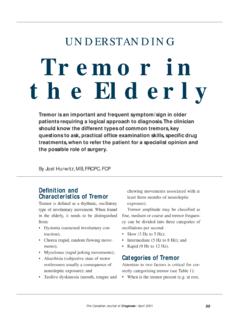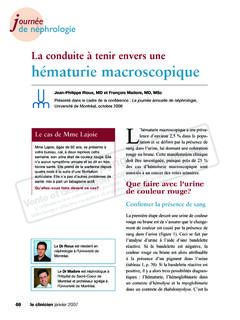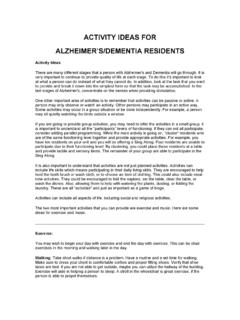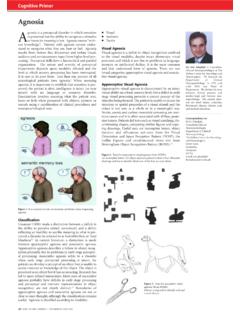Transcription of Screaming and Wailing in Dementia Patients (Part 1)
1 The Canadian Alzheimer Disease Review January 2004 11 Screaming Patients , especiallythose in the late stages ofdementia ( , totally or almosttotally aphasic), comprise one ofthe most puzzling clinical para-doxes in clinical geriatrics. Everynurse and orderly who has had totake care of a screamer, espe-cially at night, will tell you thatthis behaviour affects the well-being and quality of life of every-one around the patient. It is surprising that such a diffi-cult entity has not been exploredon all facets and that more reliefmeasures have not been herein lies the Screaming is a major con-cern for everyone working in thefield of Dementia , there have beenvery few studies on this behaviourspecifically, and even less atten-tion has been given to the topic inacademic literature.
2 For example,the academic book I consider tobe the best resource on Alzhei-mer s disease (AD) and recom-mend for everyone in the field ofAD management, entitled Clini-cal Diagnosis and Management of Alzheimer s Disease,has only a little over 30 words on the sub-ject of knows how difficultit is to manage Screaming pat-ients. Yet, many approaches, plansof treatment or medications havebeen tried with little or no suc-cess; this, I am sure, has created asense that nothing, or very little,can be must admit that, at times, apart of me shares this combat this sense of despair, Iwill review my approach to thedifficult clinical problem ofscreaming, with the hope of stim-ulating some thoughts from ourreaders and being the catalyst foran exchange of information onthis subject, including any inter-ventions or approaches whichhave been successful for people working in thefield of AD have seen a number ofscreamers who are not very ad-vanced in their Dementia , who canspeak readily with their care-Dr.
3 Groulx is Chief Psychiatrist,Ste-Anne-de-Bellevue Hospitaland Associate Professor, McGillUniversity, Montreal, and Wailing in Dementia Patients (Part 1) Screaming is a behavioural problem that can be extremely overwhelming and createenormous stress, not only on other Patients , but on staff as well. Despite the commonconcerns and frustrations with this behaviour, there is a scarcity of information availableaddressing this issue. Therefore, the purpose of Part 1 of this article is to address the issueof Screaming , discuss possible causes for the behaviour and, perhaps, inspirethoughts/feedback from our readers on this Bernard Groulx, MD, CM, FRCPC12 The Canadian Alzheimer Disease Review January 2004givers, yet still cannot explain whythey scream.
4 In these cases, withtime and patience and the real pos-sibility of communicating withthese Patients , it usually is mucheasier to determine the causes ofthe behaviour and eventually cor-rect the problem. The purpose ofthis article, therefore, is to focuson those Patients who cannot read-ily offer us information. This article will be completedin two parts. Part 1 discusses ap-proaches to evaluating behaviour-al and psychologic symptoms ofdementia and contemplates thepossible causes for screamingbehaviour. Intervention (whichwill be covered in Part 2 of thisarticle to be published in the nextissue of the Review) cannot bepossible without this the CausesThere are two basic approaches forevaluating behavioural and psycho-logic symptoms of Dementia .
5 Theseapproaches evaluate the circum-stances surrounding the )The temporal to trigger the behaviour?What seems to help relieve it ormake it less acute? Whatmakes it stop completely?b)The five Ws. Whois withthe patient or, conversely, whois absent? Whathelps, makesit worse and/or accompaniesthe behaviour? Wheredoes itoccur ( , is there a particu-lar milieu or event associatedwith it?) Whendoes it occur( , is it limited to specifictimes, such as bathtime, dur-ing hygiene care, bedtime,when the patient has to bephysically moved, daytime,evening)?The answer to these Ws andto the questions asked in the afore-mentioned temporal approach willcertainly help in understanding theproblem and in subsequent inter-ventions.
6 Unfortunately, some-times no information can be gath-ered from these questions and weare left with the last terrible W :why?Why?There are possibly as many caus-es for Screaming as there are indi-viduals who scream. However, itstill is possible to get answers to why by exploring the basics in terms of what could be goingwrong either inside or outside thepatient. trying to deter-mine what is happening within apatient that makes him/her wail orscream, it is important to start byfocusing on the most commoncauses of distress in Patients withdementia:1) Is the patient in pain? A patientin stage 6 of AD (unable totalk, unable to express pain)often shouts or screams.
7 2) Is the patient constipated? Dec-reased physical activity alongwith side effects from multiplemedications are conducive toconstipation. The constipationmay cause discomfort or evenpain and, therefore, result inscreaming from the cause for discomfortis a wet or soiled diaper; it goeswithout saying that this shouldbe looked into right ) Is the patient undernourished?Hunger is a surprisingly com-mon cause of physical discom-fort and, therefore, a potentialsource of Wailing . It is difficultto ask aphasic Patients if theyare hungry, let alone what isappealing or appetizing tothem. An inquiry made with thespouse, family or friends willhelp in this regard. Attentionalso must be given to the envi-ronment in which the patientWhile Screaming is a major concern for everyoneworking in the field of Dementia , there have been veryfew studies on this behaviour specifically,and even less attention has been given to the topic in academic Canadian Alzheimer Disease Review January 2004 13eats, as well as what he/shelikes.
8 Healthy snacks betweenmeals also may be part of thesolution in these ) Finally, there often is a mult-itude of medical or physiolog-ic factors which combine andlead to a patient s discomfortand eventual Screaming be-haviour. A standard medicalcheckup should always be a part, if not the beginning,of an evaluation for any be-havioural problem, includingscreaming. for a patient swailing or Screaming also mayinvolve the patient s external envi-ronment. Therefore, it is impor-tant to consider common externalstressors:1) Does the patient feel secure orunsafe?2) Are the schedules of the careunit made to accomodate thepatient s rhythms? In otherwords, are the patient s routineactivities (hygiene,meals,treatments, tests, etc.
9 Des-igned, where possible, to fit thepatient s schedule or only thestaff s schedule?3) Is the patient in an environ-ment that overstimulates him/her? Considering the patient sdiminished cognitive capaci-ties and the stresses inherent todementia, are too many dem-ands being made on thepatient, or do certain demandscorrespond to capacities thathe/she has lost?4) On the contrary, is the patientunderstimulated? Is his/herscreaming or Wailing a way tocreate sounds and stimulationsthat decrease anxieties? Forthat matter, is the patient expe-riencing sensory deficits thatnobody around him/her hasnoticed? I have seen patientsalmost lose their vision orhearing without anybody notic-ing, simply because the patientcould not speak.
10 These patientsstarted making certain loudnoises as a way to compensatefor their sensory losses andinability to ) Has there been a recent changein the patient s environment( , change of rooms orchange of nursing homes)? Forpatients with advanced demen-tia, having lost the capacity tomake new memories, a suddenintense disorientation can be sofrightening that it may triggerscreaming ) Has the patient been restrainedin some form? The debate sur-rounding restraints could andshould be the subject of awhole other article; in short,study after study has shownthat restraints rapidly increasethe risk of delirium and worsenbehavioural problems, restraints are per-ceived (by professional care-givers) as true security mea-sures ways to protect thepatient.

















